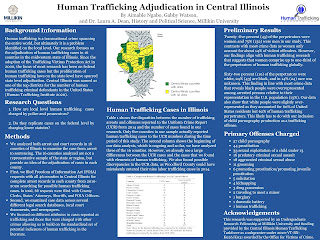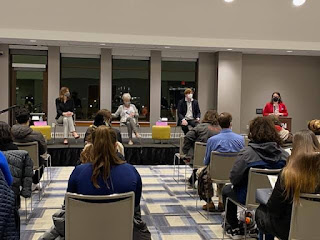Research
The Human Trafficking Research Lab @Millikin has a number of completed and ongoing research projects. Our current and fourth research project, uses the narrative policy framework to examine human trafficking narratives in Illinois and Missouri from 2000-2025. We are working to analyze the different narratives in three newspapers in Illinois (The Chicago Tribune, Peoria Journal Star, and State-Journal Register) and three newspapers in Missouri (The St. Louis Dispatch, Kansas City Star, and Jefferson City News Tribune) with the goal of exploring the narratives that can influence human trafficking policymaking. We chose Illinois and Missouri for this study because they have very different policy approaches to human trafficking. Meanwhile stories told about victims/survivors of human trafficking in the media can influence these policies so we seek to determine how these narratives in our local media are used by groups, understood by individuals, and affect socio-political understandings of policy issues. Narratives can be an effective way to frame complex issues but the stories in the media compete with the stories policymakers tell to themselves.
The third research project at the HTRL tracked all criminal cases on human trafficking in Illinois at all court levels. We focused on news media accounts and case records of human trafficking and attempting to analyze the different human trafficking dynamics in our state. We coded each case and potential case focusing on how the traffickers were identified, their arrest record, types of charges, race/ethnicity/gender of the trafficker, and sentencing data. Examining the adjudication of trafficking cases beyond the federal level allowed us to chart trends in Illinois on human trafficking which can help identify cases in the future. It provided valuable tools for precedence on the state level with local prosecutors. The compilation of this data began in Fall 2020, was presented at the Law and Courts section of the Midwest Political Science Conference in April 2022 and Pi Sigma Alpha National Student Research Conference in February 2024. The article was submitted for publication in Fall 2025.
Our article "The Social Construction of Human Trafficking Victims in the Russian Media" was accepted and published online in the European Journal on Criminal Policy and Research in 2024. This is the second published article with a student co-author Kocha Changelia and the third article to come out of the Human Trafficking Research Lab! In the article we argue that the media contributes to the development and adoption of human trafficking legislation as they frame victims of human trafficking from different perspectives, which can influence constituent and government opinions. Despite the significant need for legislation to assist victims in Russia, the government is dragging its feet on adopting more comprehensive policies. In this paper, we examine how trafficking victims are framed in the media of Russia with quantitative systemic frames and qualitative substantive frames of 682 articles on human trafficking in the Russian media from 1997 through 2015. We found that increased media coverage was closely associated with legislative changes and declined after 2008, when Russia's authoritarian regime became more solidified. The results reveal that social constructions of human trafficking victims exclude other narratives that advocate for increased victims’ assistance in the Russian media. Negative and neutral frames with victim blaming, and stereotypes contributed to the limited policy development, which criminalized trafficking but offered no support for victims.
The first project from the HTRL@Millikin began in 2018 and focused on the development and collaborations of anti-trafficking institutions established to combat human trafficking around the United States (US). "Multi-Sector Human Trafficking Task Forces in the United States: Typologies and Overlapping Jurisdictions" was co-authored with Julisa Sierra. We formulated a unique database mapping almost 200 human trafficking taskforces, coalitions, working groups and/or commissions throughout all 50 states and Puerto Rico at different levels of governance from state, to region, county, and city. Our research question seeks to determine the origin, scope, and variation of this anti-trafficking institution in the United States. We created a typology of human trafficking taskforces to show this variation, the overlapping distribution of government grants, and the impetus for the taskforces. We found shifting typologies as some taskforces were created under one auspice and then transformed to another. We also found that many taskforces conveyed a criminal justice approach and did not purport a victim centered ideology to combating and raising awareness about human trafficking. This research was presented at an academic conference in Spring 2019 and it was accepted and published in in the Journal of Modern Slavery in 2022.
Dr. Dean was inspired to write an article about her experience working with students in the Human Trafficking Research Lab for the latest issue of Anti-trafficking Review on Anti-Trafficking Education and the article entitled "Pedagogical Approaches to Human Trafficking Through Applied Research Laboratories" was published in September 2021. In the article she argues that human trafficking is a phenomenon that lends itself to hands-on pedagogical practices and undergraduate research that, in turn, can create localised knowledge with anti-trafficking stakeholders. Research labs focused on human trafficking are one-on-one or small group applied research settings that build a bridge between the university and anti-trafficking stakeholders over multiple semesters. In this paper, she argues that one way of involving students in the anti-trafficking field is through research laboratories, like the Human Trafficking Research Lab (HTRL) at Millikin University. She explores how the HTRL develops pedagogical practices to enable students to work collaboratively with a faculty member and carry out the research process from idea to final draft. Multiple learning outcomes were found, including mentorship, a larger understanding of political science as a discipline, data compilation, presentation and critical thinking skills, and job or graduate school placement. She determined that the HTRL at Millikin offers students hands-on experience with community-engaged projects, including grappling with the ethical implications of knowledge production in social justice advocacy.
The Final Community Assessment for the Central Illinois Human Trafficking Task Force was completed in November 2025 and is available to read here. The Human Trafficking Research Lab was tasked with conducting a final post-test Community Assessment of the Central Illinois Human Trafficking Task Force (CIHTTF) in accordance with the guidelines of the Enhanced Collaborative Model Task Force to Combat Human Trafficking grant from the Office for Victims of Crime, Office of Justice Programs at the U.S. Department of Justice. In the final assessment, we focused on the characteristics of human trafficking in Central Illinois and determined how we can use these data to continue to strengthen and combat these trends through the task force in our region. We also investigated questions about task force needs; key geographic and industry-specific vulnerabilities; effective prosecution tactics; and effective organizational strategies. In doing this we assessed the performance of the taskforce, identified potential areas of the community where sex and labor trafficking may be occurring, and areas for task force improvements. The final report documented task force efforts supplements survey data with the CIHTTF Facebook engagement data, CIHTTF website visits, training data, membership data, and mapping to show and assess the impact of the task force over the grant period.
In 2023, we formulated the Vulnerability Assessment is to identify areas within Central Illinois where vulnerabilities for trafficking and exploitation can occur and it available to read here. At the site visit in December 2021 we were asked by the grant monitors to update our assessment with more data on vulnerabilities in our region. The CIHTTF used this assessment to develop outreach strategies and priorities for the task force. The HTRL used a mix of quantitative data and qualitative interviews/correspondence with victim and survivor services organizations, law enforcement, and the states attorneys office to track human trafficking cases in our 46 counties. We also hosted a brainstorming session with CIHTTF members to identify factors that create vulnerabilities to trafficking. Then working backward to identify information related to those factors. We identified areas within the community where vulnerabilities for trafficking exploitation may be occurring using qualitative data with surveys and quantitative data with statistical analyses.
The Community Assessment for the Central Illinois Human Trafficking Task Force was completed in September 2021 and is available to read here. The Human Trafficking Research Lab was tasked with conducting a Community Assessment of the Central Illinois Human Trafficking Task Force (CIHTTF) in accordance with the guidelines of the Enhanced Collaborative Model Task Force to Combat Human Trafficking grant from the Office for Victims of Crime, Office of Justice Programs at the U.S. Department of Justice. The goal for the assessment was to perform a pre-test examining the performance of the task force and areas for improvements at the beginning of the grant period. In this assessment, we focused on the local needs emphasizing the gaps between what services exist in Central Illinois and goals for what should exist, identifying areas within the community where vulnerabilities for trafficking exploitation may be occurring. We also outlined overall goals for the task force grant period based on survey data from task force members. Through qualitative data with surveys and quantitative data with statistical analyses, we investigate the immediacy of the problem, interests of the agencies involved, and different initiatives on the ground to identify performance measures for the task force.










Comments
Post a Comment